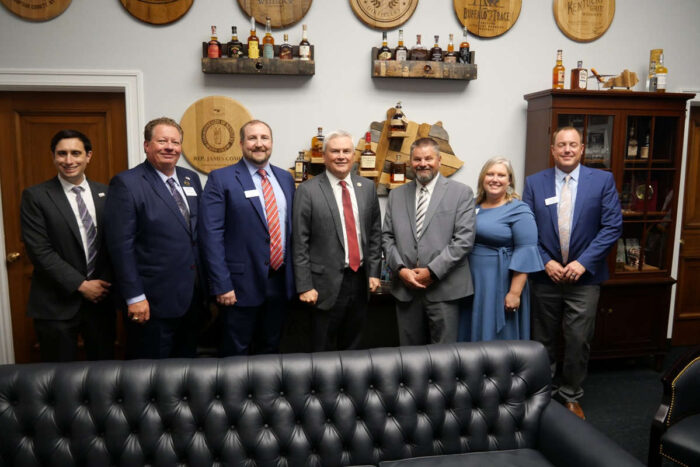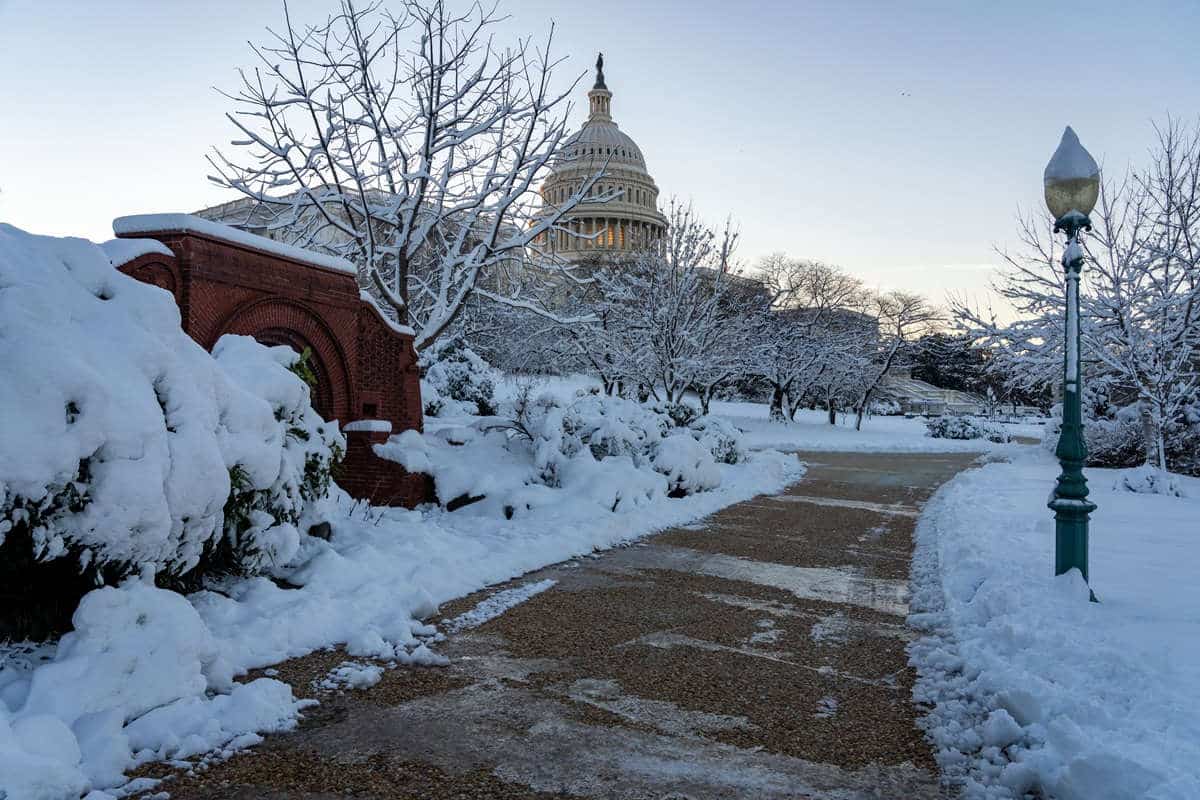NUCA Washington Summit Delivers for the Industry!

By Zack Perconti and Robert Baylor
NUCA’s advocacy, and the hard work of our members at the Washington Summit, has delivered – the utility contracting industry has scored multiple major victories in July! The budget reconciliation bill, known as the “One Big Beautiful Bill Act” (H.R. 1), signed into law on July 4th by President Trump includes not only sought-after business tax provisions but also creates the Workforce Pell Grant program, a long-standing workforce development priority for NUCA.
The Workforce Pell Grant Program, which will go into effect on July 1, 2026, includes two NUCA workforce development legislative priorities sought at the 2025 Washington Summit.
Pell Grants are the primary means of federal financial aid for low-income students – and until now, the federal government placed strict limits on their use for career and technical education programs. While students were free to use Pell Grants to attend four-year colleges and related programs, Pell Grant funding was only allowed for programs at least 600 hours and 15 weeks long. That requirement prevented students from attending many high-quality, short-term construction industry and other skilled trades training programs, which – regardless of credentials granted or job-placement outcomes – were not eligible for federal financial aid under the Pell Grant program. Some students in the past have enrolled in shorter-term programs using grants available to them through their state or the federal Workforce Innovation and Opportunity Act (WIOA). But that aid is not universally accessible, leaving many students with an affordability gap. The new law removes that roadblock, officially creating the Workforce Pell Grant program underneath the broader Pell Grant umbrella.
Pell Grants will become available to utility construction employees and jobseekers looking to enroll in short-term vocational training programs that will enhance their careers and earning potential. Under the law, programs must be between 150 and 599 class hours, and between 8 to 15 weeks. Student eligibility is tied to income and similar to that for current Pell Grants; however, unlike other Pell Grants, students seeking a Workforce Pell Grant may have already obtained an undergraduate degree. This change will provide greater flexibility to those wishing to change careers or learn job-enhancing skills. Students with a graduate degree are ineligible.
Eligible students seeking a Workforce Pell Grant will be able to obtain aid prorated from the maximum Pell Grant of $7,395 based on the number of class hours, credits, or weeks.
It will be up to the U.S. Dept. of Education to decide if programs are eligible for the grants. At present, institutions and providers eligible for Workforce Pell Grants are the same as those eligible for Pell Grants; namely, those accredited and able to receive Title IV funding under the Higher Education Act.
Over the next year, NUCA and the industry will work with the U.S. Dept. of Education on the rulemakings and implementation governing the Workforce Pell Grant program, including criteria and systems for programmatic approval, eligibility of noncredit programs, and other important aspects. States will likely play a significant role in assessing program eligibility through their governor or state workforce boards. NUCA chapters are encouraged to get involved with their local community colleges, trade schools, and their state government to help design and approve programs that meet the needs of local utility contractors.
This kind of new workforce development program was a top goal sought by 2025 Washington Summit attendees. In the over 100 meetings our Chapters held with their House and Senate lawmakers, our members emphasized that Congress needed to focus attention on creating and supporting workforce development programs to address today’s skilled labor shortages. A key talking point was for Congress to pass the bipartisan JOBS Act of 2025 (S. 383), which would have expanded the use of Pell Grants for qualified short-term credential and training programs in the construction industry. Language similar to the JOBS Act and the Bipartisan Workforce Pell Act (H.R. 6585, 118th Congress) was rolled into H.R. 1 during the final round of Senate negotiations and the legislation which was subsequently signed into law by the President.
“The inclusion of the Workforce Pell language expands Pell Grants for career and technical education, enabling more Americans to pursue high-quality, short-term training programs,” said Zack Perconti, NUCA Vice President of Government Affairs. “The employment challenges and broader industry background explained by our Summit attendees quietly built this brighter future for our utility construction industry employees, their families, and the industry as a whole.”
Our work on Capitol Hill during this Summit and the three previous Summits contributed significantly to this victory. Emphasizing to lawmakers and their staffs during their Congressional meetings that a change to the Pell Grant program to open up these grants to construction industry employees would enhance the nation’s drive to build or replace underground infrastructure worked: Congress listened and made sure some version of this legislation made it in the OBBB, even during its hectic final hours of negotiation.
NUCA’s grassroots advocacy works, and those Chapters and members who made the trip to Washington should be congratulated for their efforts to achieve this important victory.
While the next year will see regulatory action by the U.S. Dept. of Education to write the rules to implement the Workforce Pell Grant program across all 50 U.S. states, the District of Columbia, and the territories and tribal lands, a new workforce development chapter has opened for our industry because of our hard work at Washington Summit.
And not a moment too soon. The utility construction industry faces some challenging workforce statistics in the years ahead. Roughly one-half of the water utility construction workforce is eligible for retirement in the next 10 years. Today, almost 450,000 additional employees will need to be hired in the next 12 months to meet existing construction labor demands. Congress’ help is needed to close the water infrastructure investment gap, which could create more than 800,000 jobs over the next two decades.
The OBBB also included several welcome business tax provisions that will directly benefit utility contractors. The bill permanently extends the Section 199A deduction for S corporations, ensuring long-term certainty for businesses, while preserving the 37% top tax rate. Additional reforms include restoring the R&D tax credit and full expensing, relaxing the interest expense limitation, and implementing other pro-growth measures designed to strengthen American businesses and stimulate economic expansion.
While NUCA, in line with our “all of the above” energy policy, does have some concerns around provisions relating to the phaseout of certain renewable energy tax credits, overall the final language around those projects is significantly improved from earlier drafts. We intend to continue to work our industry partners to communicate the importance of these projects to the Administration and Congress, and will work to ensure that projects employing countless utility contractors delivering energy to American homes and businesses continue to move forward.
With the budget reconciliation bill in the rear-view mirror, Congress will turn its attention to annual appropriations and the normal legislative process. While we face another fight to fully fund utility infrastructure programs in the FY2026 appropriations process, NUCA has reasons to be optimistic for the future of federal funding. We continue to work with Congress on reauthorizing key aspects of the Infrastructure Investment and Jobs Act – specifically, surface transportation programs and the EPA Clean Water and Drinking Water State Revolving Funds. We expect to see some movement on those priorities later this fall. The final year of IIJA-related funding for both areas is FY26, and the deadline for reauthorization is September 30th, 2026. SRF reauthorization will likely be rolled into the Surface Transportation Reauthorization bill, and it may be a vehicle for other important NUCA priorities, including permitting reform and work zone safety.
With the continued help of the membership, our victories in Congress and Washington will allow NUCA to continue advancing industry priorities into 2026 and beyond.
Zack Perconti is the Vice President of NUCA Government Affairs. Robert Baylor is NUCA’s communication director.




